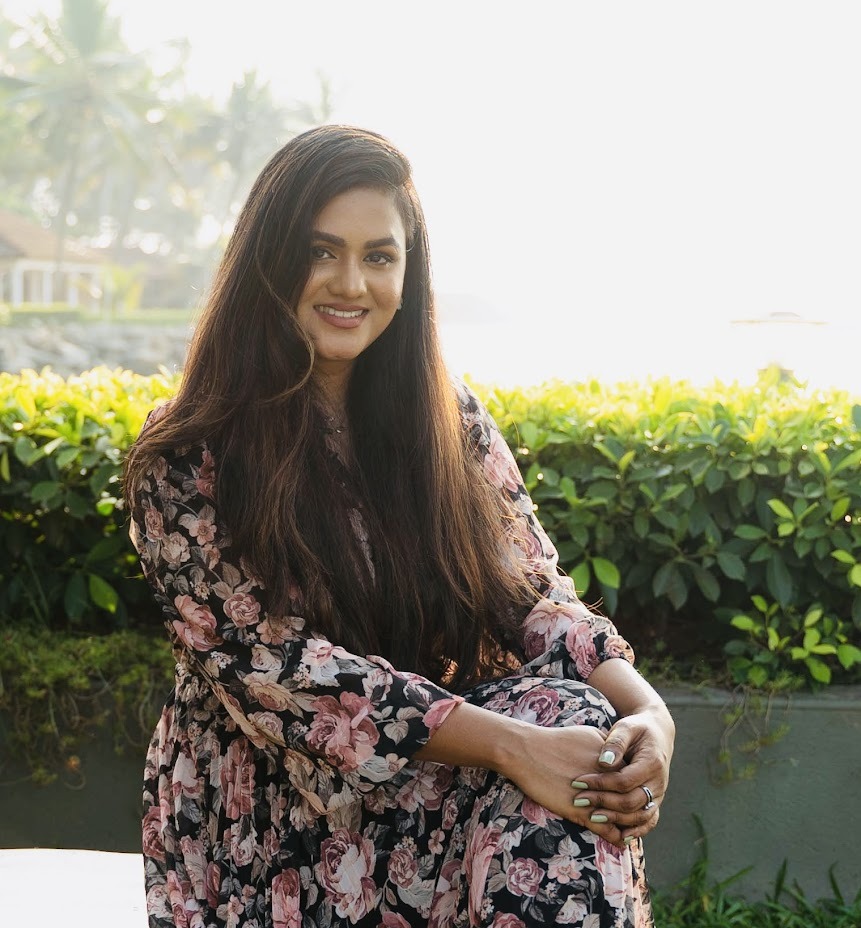Bridging Ancient Wisdom with Modern Wellness: SPJ Alumni Spotlight with Dr Rekha Radhamony (EMBA 2018)

Could you tell us a bit about yourself and your journey into Ayurveda?
I am Dr Rekha Radhamony, a 4th generation Ayurvedic doctor based in Kerala and Dubai with an extensive Ayurveda practice with patients across the world. I started Adirekha Ayurveda Hospital in Thiruvananthapuram, Kerala, in 2023, where I lead a team of 8 skilled doctors and 24 nutritionists. Together, we offer holistic health programs both in-person and online to help people manage their health effectively.
I believe in the power of real Ayurveda and therefore, adhere to ancient Ayurvedic texts (Samhitas) to provide treatment to my patients. That is why I have developed my own line of Ayurvedic products specialising in skin and hair care. I also manufacture Ayurvedic medicines using traditional methods and recipes mentioned in the Samhitas at my hospital.
Apart from consultations at my hospital, I extend my services globally through online consultations. I’m also actively engaged in delivering talks with the aim of busting misconceptions about Ayurveda while promoting a deeper understanding of its authentic principles. So far, I have conducted talks for esteemed organisations like Google, DEWA, DWTC, Expo 2020, etc.
What inspired you to pursue a career in Ayurveda and holistic wellness?
Growing up in an Ayurvedic family, I was encouraged to pursue Ayurveda as my career path. In the beginning, I didn’t fully believe in the power of Ayurveda and chose it based on my family’s recommendation. However, my perspective changed after a personal experience.
During my time at university, I was diagnosed with rheumatic fever, a condition for which all other systems of medicine offered me very little hope. Doctors informed me that I might spend my life in a wheelchair, reliant on medications and unable to lead a normal life. It was Ayurveda that came to my rescue when everything else failed. After months of Ayurvedic treatment, I was back to normal. I did not have any relapse and recovered completely. Experiencing the effectiveness of Ayurveda firsthand, I knew that this was the path I was meant to follow.
What are the ongoing research and advancements in Ayurveda? How do you see them shaping the future of holistic wellness practices?
There are three main periods of Ayurveda, based on its popularity. The first was before the British rule in India when Ayurveda was thriving and well-developed. Then came the British era, when modern medicine took over, and Ayurveda became less important. After we gained independence, Ayurveda slowly regained its popularity.
But post-COVID, more people are turning to holistic wellness like never before. Nowadays, the Ayurvedic product market is booming worldwide. There’s a lot of research and innovation happening in Ayurvedic medicines, tailoring them to fit modern lifestyles and treat various diseases.
How did SP Jain Global help you gain relevant skills to excel in the medical field?
Before I joined SP Jain Global, I was simply a focused Ayurvedic doctor, concentrating solely on treatment. However, my outlook changed entirely after I joined the school for my MBA. I discovered a whole new world, which expanded my horizons. SP Jain Global provided a platform for me to engage with people from various industries and fields, who offered a wealth of knowledge. I maintain connections with many of them to this day. The network I formed there has greatly strengthened me, and it continues to expand.
What are some common misconceptions about Ayurveda, and how do you try to dispel them in your general interactions and with patients?
There are numerous misconceptions about Ayurveda. Ayurvedic medicines are very easily available over the counter. People think Ayurvedic medicines are harmless and take them without even consulting with an Ayurvedic doctor. But the truth is one man’s medicine could be another man’s poison, meaning what works for one person might not work for another. Ayurvedic medicines can have side effects if not taken in the right manner. So, it’s important to consult a doctor before taking them.
One of the reasons why I started my Instagram page and YouTube channel was to bust such misconceptions about Ayurveda. How Ayurveda is practised in India is different from how it’s practised by the rest of the world. Real Ayurveda is what’s written in Samhitas. But it is not even practised by most people in India. So, I created my social media channels to spread awareness about Ayurveda from the Samhitas without losing its essence.
How do you try to strike a balance between traditional Ayurvedic practices and modern lifestyle demands while creating personalised treatment plans for your patients?
In today’s fast-paced world, people have little time to spare. So, I try to simplify Ayurveda, making its practices easier to incorporate into daily life. Even though Ayurveda isn’t modernised, the practices mentioned in Ayurvedic texts from 1,000 years ago are still valuable today. People are beginning to explore Ayurveda more and realise that its beauty lies in its timeless wisdom.
For instance, in the past, oil consumption was frowned upon, but now research shows that good fats are beneficial. This was something Ayurveda has always emphasised. Similarly, Ayurveda has long advocated for having the last meal of the day before sunset, without any fancy terms like intermittent fasting. As people grasp these concepts, they’re finding Ayurveda increasingly relevant in modern times.
What advice would you share with students who wish to follow in your footsteps?
One piece of advice is to keep your mind open, like an empty vessel ready to be filled with new ideas and experiences. There isn’t just one way to do things. Just because something is done a certain way doesn’t mean that it’s the only way. Always be open to exploring different options. When you keep your mind open, you’re open to learning new things. Life is full of diverse experiences, and there’s a vast world beyond what we already know. To stay aware, keep your eyes and ears open. When you learn new things, you grow.
Despite my busy schedule, I decided to pursue the MBA program at SP Jain to understand how businesses operate. Every day during the program, I encountered case studies that included countless stories of success and failure. All those experiences gave me a fresh perspective on what works and what doesn’t.
Remember, every little thing you learn is important. That’s why it’s crucial to keep your mind open and ready to absorb new knowledge.
Related Posts
-
 In This World of Internationalisation, Will You Survive?
No Comments | Jul 27, 2011
In This World of Internationalisation, Will You Survive?
No Comments | Jul 27, 2011 -
 Key to great interviewing
No Comments | Aug 19, 2011
Key to great interviewing
No Comments | Aug 19, 2011 -
 The Perks of Having a Global Network
No Comments | Oct 30, 2014
The Perks of Having a Global Network
No Comments | Oct 30, 2014 -
 Breaking corporates shackles to start a wealth management boutique
No Comments | Feb 18, 2015
Breaking corporates shackles to start a wealth management boutique
No Comments | Feb 18, 2015
